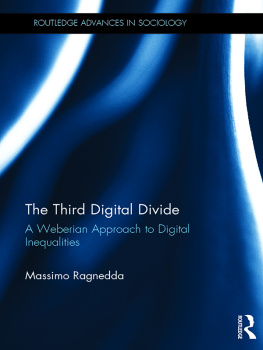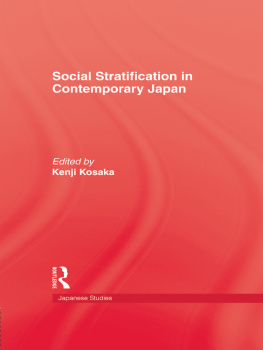ETHNIC STRATIFICATION AND ECONOMIC INEQUALITY AROUND THE WORLD
While global inequalities have had popular as well as academic attention for years, in recent years the developed world has suddenly woken up to the rising inequality within wealthy nations, particularly in the United States. So far, explanations for this growing inequality have focused on changes in the global economy and its impact within nations. Max Haller has written a well-researched and timely book showing how inequality within nations is more complex and involves differences in racial stratification as well as economic changes.
Harold Kerbo, California Polytechnic State University, USA
Max Hallers work is commendable for its comparative perspective, comprehensive coverage and wealth of empirical data, deftness of analysis and for its historically-sensitive approach. Refreshingly, the volume goes beyond arm-chair theorizing about inequality and offers, on the basis of a vast and carefully-marshalled array of empirical data, some valuable suggestions for reducing levels of inequality between and within nations and mitigating the suffering and hardships of excluded and marginalized groups in society.
A. R. Momin, University of Mumbai, India
Ethnic Stratification and Economic Inequality around the World
The End of Exploitation and Exclusion?
MAX HALLER
in collaboration with ANJA EDER
both at the University of Graz, Austria
First published 2015 by Ashgate Publishing
Published 2016 by Routledge
2 Park Square, Milton Park, Abingdon, Oxon OX14 4RN
711 Third Avenue, New York, NY 10017, USA
Routledge is an imprint of the Taylor & Francis Group, an informa business
Copyright Max Haller in collaboration with Anja Eder 2015
Max Haller in collaboration with Anja Eder have asserted his right under the Copyright, Designs and Patents Act, 1988, to be identified as the author of this work.
All rights reserved. No part of this book may be reprinted or reproduced or utilised in any form or by any electronic, mechanical, or other means, now known or hereafter invented, including photocopying and recording, or in any information storage or retrieval system, without permission in writing from the publishers.
Notice:
Product or corporate names may be trademarks or registered trademarks, and are used only for identification and explanation without intent to infringe.
British Library Cataloguing in Publication Data
A catalogue record for this book is available from the British Library
Library of Congress Cataloging-in-Publication Data
Haller, Max, Dr.
Ethnic stratification and economic inequality around the world : the end of exploitation and exclusion? / by Max Haller in collaboration with Anja Eder.
pages cm
Includes bibliographical references and index.
ISBN 978-1-4094-4952-2 (hardback) ISBN 978-1-3155-8048-7 (ebook) ISBN 978-1-3171-4088-7 (epub) 1. Income distribution. 2. Equality. 3. Ethnic groups. 4. Social classes. I. Eder, Anja. II. Title.
HC79.I5H35 2014
339.22089dc23
2014018335
ISBN 9781409449522 (hbk)
ISBN 9781315580487 (ebk-PDF)
ISBN 9781317140887 (ebk-ePUB)
Contents
List of Figures
List of Tables
Preface
The Problem
In 2009, worldwide there were 1.9 billion poor people who had to live with less than one Dollar per day. Extreme poverty, daily hunger, afflicted 40 million.1 GNP per capita, adjusted for purchasing power, was 52,000 Dollar in the United States, 43,000 in West European countries like Austria, Netherlands and Sweden, but only 3,900 in India and 550 in Burundi and Eritrea. At the same time, over 10 million persons owned more than one million Dollars worldwide, and 1,200 persons were billionaires, owning one billion (one thousand million dollars). It is obvious to ascribe these extreme differences to global injustices, privileges and discriminations. Yet, 70% of the poor do not live in the poorest countries of the world but in those with a middle income seen in global terms. 643,000 millionaires live in China whose GNP per capita is 9,000 Dollars, in Brazil 165,000.2 The list of the super-rich of this world is headed in 2012 by a Mexican; among the twenty two richest billionaires there is one Chinese and one Indian. Global inequality, the difference between the mean incomes between the richest and the poorest countries of the world, is blatant and the rich countries of the global North could and certainly should do much more to alleviate poverty in the South. However, this is a task which cannot be solved by the North or at the global level alone. The central thesis of this book is that inequality within nation states is at least as large, if not larger, than that between the rich and poor ones; widespread poverty and massive inequality exists also within nations. What is particularly important: It is mainly at the level of the nation state that inequality and poverty can be tackled in political terms. Even some poor nations have been able to reduce or contain their internal poverty and inequality in a significant way; in others, strong economic growth has indeed reduced poverty but it has also increased internal inequality. To understand why this is so is not only a task for politics, it is also an eminent task of comparative social science. My argument is that it has received, by far, too little attention and that only partial explanations have been provided for it.
This book seeks to make a contribution to understanding this problem. It is the result of a long-standing work which began some five years ago. It resulted from three principal areas of interest of mine, namely social inequality, stratification and mobility; ethnic and national identity and relations; and European macro-regional integration. A significant part of the book was elaborated during my stay as a visiting researcher at the Wissenschaftszentrum Berlin fr Sozialforschung (Germany) in the Winter Term 2008/09. There, I profited a lot from discussions with Jens Alber and Ulrich Kohler at the Department Inequality and Social Integration. Many critical and helpful responses from presenting draft papers and lectures at conferences and invited lectures helped me to elaborate the basic ideas. They include the following lectures: The state and the interaction between class and ethnic stratification. Explaining world-wide differences in income inequality, Department of Sociology, University of Minnesota, Minneapolis (22 April 2008); Patterns of ethnic stratification and their consequences for inequality within the different countries of the world, Department of Sociology, Kharkiv National University, Ukraine (November 11, 2008); Die sozialen Klassen im ethnisch heterogenen Milieu. Zur Erklrung der konomischen Ungleichheit im weltweiten Vergleich, Lecture Series Global Sociology, University of Graz (5 May 2009); Why Empires build Walls. Sociological considerations about the new Iron Curtain between Africa and Europe (and between the South and North in general), Department of Anthropology and Sociology, Universidade Estadual Paulista (UNESP), Sao Paolo, Brazil (27 April 2011); Why is economic inequality so high in Africa? A theory of ethnic stratification, St. Augustine University, Mwanza, Tanzania (3 February 2012); Ethnic class stratification and economic inequality. A global comparative analysis, Vienna Institute of Demography, Austrian Academy of Sciences (3 July 2012); Glaring Inequality. The Heritage of Slavery from the Perspective of Historical and Comparative Sociology, Conference of the British Sociological Association, Theory Study Group, Birmingham (1112 July 2011); Extreme konomische Ungleichheit in der Welt von heute ein Erbe historischer und Resultat moderner Formen von Sklaverei, University of Salzburg, Lecture Series Human Trafficking (23 May 2013); Ethnic stratification and income inequality. The legacy of slavery. Annual Meeting of the American Sociological Association, New York (1013 August 2013) Ethnic stratification and income inequality around the world. The Legacy of Slavery, Department of Development Studies, University of Vienna (16 October 2013).







